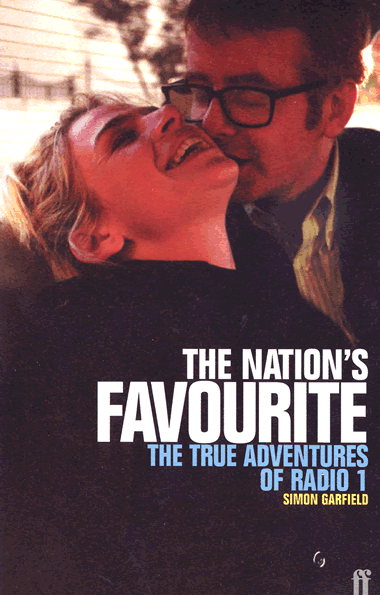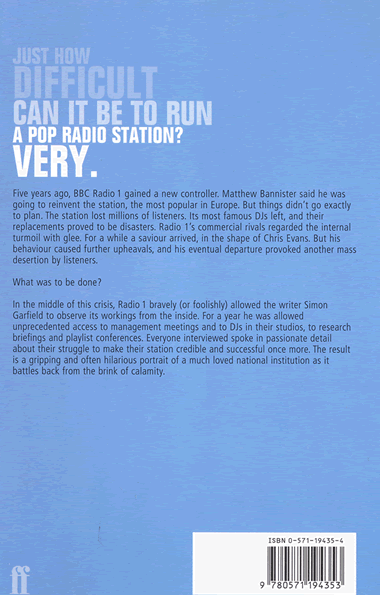The Nation’s Favourite
he Nation’s Favourite – The True Adventures of Radio 1
About the book
In 1997 I came back from a holiday in California with an idea. I had just read Sarah Vowell’s book Radio On, in which she kept an engaging diary of her travels listening to local stations throughout America. I realized how rare it was for people to write well about radio, despite its great popularity. I spoke to Julian Loose, my editor at Faber, and he mentioned that he was quite intrigued by the whole Chris Evans soap opera at Radio 1 (this was at the time when Evans would do something tabloid-outrageous on the breakfast show every day, the most outrageous thing of all being not turning up). I wasn’t that interested at first, although it was clear that the story of how the management had cleared out all the old dinosaurs in an attempt to drag the station into the modern age was almost certainly worth telling, especially if I could get some sort of insider access. This was unlikely, for one reason: it was the BBC. The BBC didn’t like opening up its files to anyone, and was definitely not going to let its staff talk to me about what had clearly been a tortuous time. But we wrote to the Corporation anyway.
Astonishingly, the Corporation seemed to be up for it. I had a few meetings with Matthew Bannister, the station’s controller, and with the BBC corporate publicity team, and they said they were eager to tell their side of the saga. I said I wanted to tell all sides of the saga, and they said ‘okay’. The even better news was that there were no conditions. I could talk to anyone I wanted – DJs, producers, management – and I was also able to attend management meetings and live broadcasts. I agreed that I would show the resulting manuscript to Bannister before publication to discuss any points of contention and correct errors, but the final edit would be mine.
I had a fantastic time, and for six months I treated the Radio 1 building off Great Portland Street as my home. Everyone was very accommodating, and although some people were initially reluctant to speak to me, it was clear that they all had a lot they wanted to say. The Nation’s Favourite is a story of modernisation, competition and very big egos. There are several subplots – old DJs versus new, presenters versus management, old management versus new management, the struggle to find a breakfast show that wouldn’t explode after three weeks – and I thought the best way to tell them was to let all the participants speak for themselves. So, like The Wrestling, the book is an oral history with narrative asides from me. The best stories, inevitably, are those told by the much-missed John Peel, although my favourite single line is from Steve Lamacq, who said, in the light of John Peel’s many on-air mistakes, that he looked forward to the day when Peel would introduce a live band at a rock festival and ‘put them on at the wrong speed’.
The only person at the station I didn’t much like was the new boy, Chris Moyles. He was brought in from Capital initially to do the early morning shift, but the management clearly thought he would go far. He struck me as an egotistical oaf with only moderate talent, a view I still cling to in the face of his great success.
But I enjoyed spending time with everyone else there.
The extract is not taken directly from the book, but is a compilation of my favourite John Peel stories from the interviews I conducted while writing it, and collated for The Observer in the week of his death.
The audio clip is of Alex Lowe performing a few excerpts from his one-man show based on the book – scenes featuring Peel, Simon Bates and Matthew Bannister.
The Nation’s Favourite – The True Adventures of Radio 1
Extract
John Peel died suddenly on holiday in Peru at the age of 65. These are a few of the things he had to say.
Six years ago I conducted a series of interviews with John Peel at Radio 1 and in the wine bar nearby. It wasn’t difficult work: I turned on the tape-recorder and sat back, and after ten minutes of mild suspicion and Rioja he hit a groove of sad and funny stories that brought tears to his eyes and mine, and all I could do was hope the batteries were fresh.
My memory of him is of a hugely sensitive man who cared very much about his music and his family, but also about how he was regarded by others. A magazine interview he had given some months before had been very harsh on him, questioning whether he genuinely liked most of the records he played, and Peel had been terribly hurt by it. Looking back, it is significant how often in our conversations he considered his standing among his peers, and how much he relished his reputation as a pariah within the corporation.
This was a role he found useful to foster, but in truth he was a shy and quiet man, prone to internalising his anger. And he was immensely loyal; he knew that he could only function in public service broadcasting, and in time he became its best advertisement.
I had first met him eighteen years earlier when he provided the narration for a radio documentary I had written. I told him how thrilled I was to hear him voice my script, and was astonished when he replied that he was genuinely happy to have the extra work. The extent of his talents was not fully exploited until Home Truths many years later. His impact on so many lives has not been fully measured until this week.
Read the full extract .pdf format (26k)
Garfield has a genius for being sparked to life by esoteric enthusiasm and charming readers with his delight.


